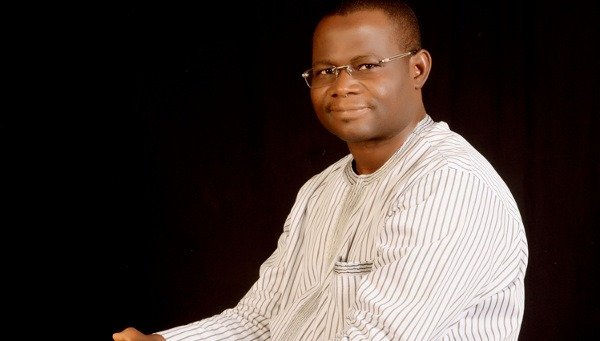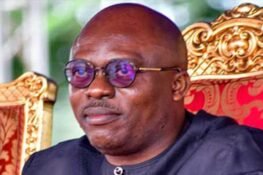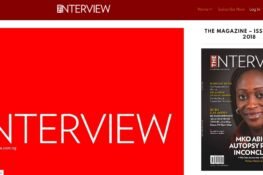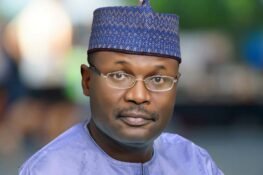To describe Alhaji Ishiaq Ajibola as achievement personified is to say the obvious. This co-founder of Daily Trust Ltd, one of the most successful newspapers in Nigeria, and certainly the clear leader in Northern Nigeria, tells The Interview how the journey to building a mighty media conglomerate started small. Now retired, the former MD of Daily Trust describes the astute and scrupulous management style that has made the paper thrive in a terrain akin to a shark pool.
You are an economist by training; what inspired your career in print media?
I have always been interested in the media. When I was in the university, I used to go to the library to read newspapers and then I was just fascinated by the world of the media. I wanted to be like media people. I don’t know why but I had the feeling when I was in the university. So after I had my B.Sc in economics from Ahmadu Bello University (ABU), Zaria, I didn’t bother to look for a job in the bank. I wanted to work in the media and I responded to advertisements related to vacancies in the media, especially the print media.
Do you have any regrets?
I don’t have any regrets at all. I think I love my freedom and the flexibility that come with it.
You were not thinking about the money?
No, not really. I think the motivation was not really money. I was not looking at the money part, because if the motivation was money, the banks were paying much more than the media then. How much was the media paying? I just wanted to satisfy my aspiration then as a young man.
What inspired your book, My Newspaper Odyssey?’
When you look around, you will hardly find a book in the media that combines the total operation of the media in terms of the editorial, production, advertisement – I mean the commercial side – in one. I had tried to look for such book before and I didn’t get any. What it means is that there seems to be a missing link between the editorial and the other side of the media, which is the business side. Most of the books and participation on media activities you’ll find in Nigeria are on core editorial journalism. There seems not to be enough sharing of ideas in the business aspect of the media. Like I said, having seen it all as a managing director of Daily Trust Newspaper, I thought it would be good to write a book on the media, generally on the newspaper business. And much more than that, I had a unique experience in newspaper publishing, because in the newspaper I worked, which is Daily Trust, we started without much money. We started as young people who were just inspired by starting a business and we were able to grow into a very big or a fairly successful business. These are things that inspired to me to say, well, why can’t I write a book?
In the book, you shared your experience at JustPolitics, Litchfield, Citizen and Sentinel. One common thing in the story you shared, and what is obtainable in some media outfits in Nigeria today, is the inability of publishing companies to stay afloat financially. What are the factors responsible for this?
I don’t totally agree with you. If you look at my experience in the places I worked, the Litchfield Nigeria Ltd, which was actually not a newspaper – just a printing and publishing outfit, Sentinel and Citizen magazines, there was no serious business success. In fact, in one of the magazines – Citizen – it was said that there was editorial success but no business success. Even that is contestable because there is a thin line between editorial successes. When you are editorially successful, it is likely you will be successful business-wise. But we used to say that there was editorial success because those who were at the top management level were all journalists. There was nobody looking at the business side. They were all writing beautiful articles as top management in Citizen and there was nobody looking at the business side of the media. But in Daily Trust, I think Daily Trust is fairly successful. From day one we were making profit. It may be small profit. And up to the point, we were able to build our headquarters at Utako, Abuja, We never had any issue with finances and we were able to pay our staff. In fact, we said salaries must be paid on the 25th of every month. If it exceeds 25th, that means it fell on a weekend. What I am trying to say is that from my own personal experience, Daily Trust was fairly successful to the extent that we never had any financial problem when I was there as managing director.
What would you suggest as a way out for insolvent media platforms?
I think that our experience is a bit unique in the sense that there must be a synergy between editorial and business all the time. In other newspapers, the owners, publishers look at the newspaper business purely from the editorial point of view. They don’t see the need for a top management staff with authority who would focus on the business side of newspaper publishing. I think, in the way it happened in Daily Trust, I was looking at the business side of the business and that helped a lot.
How do newspapers strike a balance between ethics and business survival?
Journalism ethics are very clear. You shouldn’t be biased; you should be fair and balanced. They are all there in the books. The history of journalism in the world is such that even America is trying to build a wall between editorial and business. Like Chicago Tribune,for example, I know the editorial people (staff) had a separate lift from the business people. They created a very strong wall between these two departments. They didn’t want a mix because they didn’t want those in the business department to influence editorial stories. But that was then. Right now, there is a blend of interest between the two separate departments – what we call the synergy between the two departments: editorial and business.
I am not saying that newspapers should compromise their editorial policy. No, that’s not what I am saying. I oppose a situation whereby editorial staff should be engaged in business operations. Some newspapers would ask journalists to go look for adverts. That is wrong. We never did that in Daily Trust and up until now, we don’t do that. If you are a journalist, go look for stories and write your stories. I recall I gave editors query because advert monies were being paid through their accounts to the company, because what corporate affairs officials of these companies want to do is to corrupt journalists. They want to give money to them so that they can deduct their commission before they pay it to the company. I discovered that and I gave a query. The ethics are such that journalists should do their work and adverts executives should do their work. But at the top management, there should be synergy, the top management should be able to say, look, this is the birthday picture of a managing director of a company, maybe it is a social diary picture and I want the editor to use it in the paper. There is nothing wrong with that, because that is the synergy we are talking about. By the time the managing director sees the picture, he is happy and will be able to say, ‘oh this people have used my picture, next time you have an advert, give them’. It is not because you used the picture that it is making him give you the advert, but because of your professionalism. So, the top management should ensure that this synergy is always there, to ensure that editorial things don’t mix with business and business does not mix with editorial. Because if you mix them too much, you will compromise the ethics of the profession. You will find out that journalists will be going out to look for adverts, and when they do that, it will influence what they write and it won’t be good for the paper.
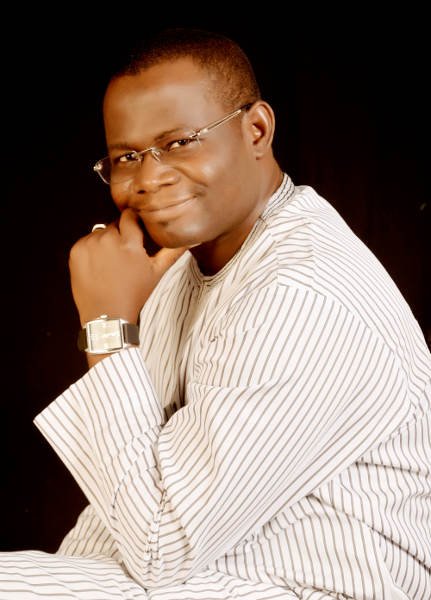 In 1996, you co-founded Media Trust Ltd with some friends with just the sum N20,000 in a Boys’ Quarter apartment; did you ever envisage that it would grow into the successful national newspaper it is today?
In 1996, you co-founded Media Trust Ltd with some friends with just the sum N20,000 in a Boys’ Quarter apartment; did you ever envisage that it would grow into the successful national newspaper it is today?
Never. We never knew it was going to be a successful media outfit. We were just taking our chances. In fact, we started out as a media communication company, what you may now call an advertising and public relations outfit. That was how we started.It was much later, about two years after we started, that we said let’s start a newspaper since we have the capacity and experience to start a newspaper.
So, it was growing the company from the scratch, to taking bigger opportunities when we found out that there was no newspaper in the north. We found a need and fulfilled it, what we call the FINAFI principle in management: Find a Need and Fulfill It. We were all in Kaduna in those days and we found out that there were no newspapers in the north, so we filled the gap by founding a newspaper. That was two years after we had done media communications. You could see that it was done gradually; we never knew it was going to be successful.
You served as managing director in Daily Trust, what kept your company afloat in this hostile business environment?
What we don’t compromise at Daily Trust are editorial independence, integrity and professionalism. When you look at the core values of the paper, it has all these. In fact, we practise what we call ‘No Thank You’ principle. We do not want our journalists to take the so-called brown envelopes that other journalists take. That alone set us apart in terms of quality editorial content. Also, in the business aspect, there are lots of checks, a lot of professionalism in dealing with issues. We have a system and we were able to build the system to an autopilot system that even me, as a managing director, was not able to take one naira from the system without due process. Even the chairman of the company is not able to take N10,000 from the company without due process. There is an autopilot system. Everything is based on a system that determines what you are entitled to and what you are not entitled to. If you are travelling, how much you will travel with is determined. Everything is on the table. It is an open system. If we are doing purchases, there is a committee that will handle it. I think these and other virtues kept the company afloat.
The atmosphere and environment under which Daily Trust was birthed was quite hostile. Nigeria was under a military rule that was clamping down on media houses; there was no surviving paper in the region, yet Daily Trust made it; was it luck or hard work?
It was both. Essentially, when you have a hostile environment like that, the progressives will not keep quiet. Critical and discerning minds will want to know what is happening.
I am sure you know what we call guerrilla journalism – a situation whereby you just see newspapers on the streets but you don’t know where they are printed. It was going on at that time. I don’t want to mention the name of any newspapers they were publishing without anybody knowing where they were publishing from. It was as difficult as that because the military regimes were tough on newspapers, closing down some newspapers. But still, newspapers and magazines were coming out without people knowing where they printed from. Guerrilla journalism. There are people who love that kind of environment. There were people who really wanted to read the news that time. It was not like this time when you can sit on your bed and read the news on the internet.
So, for the fact that the environment was hostile was an opportunity on its own for business to strive. It was an opportunity for courageous newspapers to thrive because like I said earlier, there were critical mind who wanted to know what was going on then. As difficult as it was then, people were getting information. In fact, there were top military officers who were leaking out information to journalists.
So, the hostility was a blessing in disguise?
Yes it was a blessing in disguise and an opportunity on its own for those who were courageous to take it.
Tell us some of the teething problems you encountered in your foray in the Nigerian media.
You mean generally in the media? I think the teething problem that is a bit general, some of them have been resolved while some are just coming up. In those days, there used to be a big problem with distribution of newspapers; the logistics of distribution was a nightmare. Everybody bought vehicles and put on the roads and were traveling from one location to another to distribute newspapers. I remember in those days, Guardian, Champion, Kwara Herald -all had their vehicles for distribution of newspapers in the night. Then, before you could think of starting a newspaper, you need lots of money to buy circulation vehicles, but now it is no longer a problem, because everybody has realized that you don’t need to buy all those vehicles to circulate your paper. In fact, there is multiple printing now; you can print in Abuja, Lagos and Port Harcourt at the same time. Through the satellite, you send your materials and you are all over the place, so you don’t need those vehicles. So, technology actually reduced some of the problems. But as those problems are being resolved, news one are surfacing. Look at the cost of newsprint today. It is so high because of the dollar rate. And also because, every input into the production of a newspaper, such as ink, newsprint, plate and machines, are all imported. And just like other businesses, it is becoming very difficult for newspapers to surmount these problems, thrive and make enough money.
I think another issue is the quality of personnel in all the departments. Right now in Nigeria – I don’t think this is limited to the media alone – it is difficult to find quality people. Out of ten, you probably find two that are good. So, recruiting people is a difficult thing. Getting them to do the work is another problem; they have issues with ethics and commitment and this is a big problem, not just to the media but the society in general.
It was rumoured that you were forced out of your position as MD of Daily Trust; what happened?
Rumoured! No, I was never forced out. I retired on my own as managing director. It was well publicized. Part of our succession planning was that those of us who were members of the founding team would exit at a time and leave the management of the newspaper to a new set of people. The chairman, Mallam Kabiru Yusuf, and I founded the paper from day one. He also has exited as CEO of the company. He has retired. So two of us are out of the place.
In this age of online news platform and its huge advantage over hard copy newspapers, will hard copy newsprint survive another three centuries?
Three centuries is too long a time to predict. From what we have seen in the last five years, I am so amazed by the migration of readers from the conventional newspaper to the online platforms, myself inclusive. I must confess that I read most of the news online. I used to have all copies of newspapers in my possession, but now I have them on my iPad. To me, it’s a big indication that readership is moving online. I have a company, CBD Media Edge Communications Ltd. One of the things we focus on is opinion poll survey. We recently did an opinion poll on the relationship between hard copy newspapers and online. What we found out that from that survey report was that there is a massive migration of readers from the hard copy newspapers to the online news platforms. I am not saying that there will be total eradication of the hard copy. No, because even abroad, when Amazon started, everybody thought nobody was going to read hard copy books anymore. I read a report that even said that everybody will move to read only online books; they will no long buy hard copy books, but it’s not true. After a while, another report revealed that people are still reading and buying hard copy books. But online news will affect the newspaper industry more because newspaper news dies quickly, unlike books that people could return to read over again. Of course, newspaper will be affected by online news but it won’t be totally eradicated. Hard copy newspapers can also move online. For the first time, I think this year or last year, New York Times, said what they made from advertisement revenue was equal to what they made from the hard copy. So newspapers must move online and be innovative.
Look at some of the online newspapers in Nigeria today (I don’t want to mention names), they are credible; people are waiting for their news because they are credible. Even your paper – The Interview – look at the kind of credibility and the kind of interest it has generated. If people don’t want to read the online version, they can go online. The important thing is that your content is very rich. You are interviewing and engaging serious people in discussion. Is it every journalist that will have the opportunity to interview the president and past governors like you do? So, at the end of the day, it is content that will matter at the end of the day.
Tell us who was ‘Janwuya’ in your book?
(Laughs) Janwuya! When I was general manager, that was my first title in Daily Trust. When we started, we said we didn’t want to answer big titles. So I was the general manager and the former chairman was the managing director. After some time, I heard they call me ‘Janwuya’, which is a Hausa word for redneck officer. What that means was somebody who is tough – and I was really tough at the beginning. I remember we were printing 2,000 copies weekly. And I ensured that I traced each copy to its destination. It’s either it was sold or returned as unsold. That way, I was tough. I was also tough on processes. We were trying to form a process; we did not have an accountant, and we did not have marketers. In fact, we fired someone within a month that we employed him for misappropriating about N6,000. I was tough, so they called me ‘Janwuya’, but they were not saying it in my hearing. It was later I got to know that they were calling me ‘Janwuya’.
Many Nigerians who have excelled in either private or public sector retire to politics; do you have any political ambition?
I am actually likely to be involved in politics to a certain extent, in the sense that I was so inspired by the clamour for change and some young people came to me that I must participate in the whole thing and that I must be involved in the whole thing. In any case, even before the clamour for change, I had been involved in it underground because we wanted a changed society, to be honest. I participated and publicly campaigned in my area during the election.
16. Do you havea political ambition in your area?
I don’t want to call it a political ambition. I just want to be part of the change, part of an egalitarian society because already, as a private person, I do what I can do in my little way for my people. If you know my area, I have done the little I can in my capacity to help my people. For the society to change to a better society, I was passionate about it for that reason, I was involved in the politics of my area.
From Ife Olukotun, Kogi State, where you hail from, there seems not to be much heard from people there politically; are you aspiring to be the first big politician from there?
I don’t want to agree with you, because I think, right now, the secretary to the state government in my state, Kogi State, is from my hometown. Then also, I was the chairman of media and publicity committee of the present governor’s inauguration. We may not have a minister or ambassadors, but in our little way, our people are actively involved. There are certain things I hate in politics. I think people’s expectations are always too much in politics, especially now that the country does not have the resources to meet the expectations of the people. So, there’s pressure on people, the so-called elite, to deliver for them; I don’t like it. I prefer a situation where I can address issues in not that combative manner; in that active politics you are talking about. I don’t have to be involved in the combative politics before I contribute my quota.
Given your active involvement in the last election in your area – Kogi State – in the quest for change and power shift, has change really come after the power shift?
We are still watching. We are trying to see. The change seems slow, I must be honest with you, but we are still hopeful that there will be change.
As a trained economist who had a successful career in the Nigerian media industry and now in business, what are key strategies you would suggest to people in business in this period of recession?
The first important thing is how to cut cost. This is not the time to take some unnecessary risks, because if you take some risks now, you may regret them forever. But having said that, remember I said lack of democracy and the agitation of people for democracy were part of the reasons our newspaper survived. Also, this is a period of opportunity in some business. To be able to decipher and know that kind of business is the challenge for everybody. There is certainly opportunity in a period of recession.
Tell us three of your unforgettable childhood experiences.
Childhood experiences? I am sorry, I cannot recall any for now. I don’t want to specifically discuss them now; maybe in the future. (Laughs).
Who are your role models?
Chief Ajibola Ogunsola is one of my role models. He is a straightforward, down to earth, honest and intelligent person.
What is your advice for young people?
Nothing comes easy – it is a common adage. I think one of the problems we have in Nigeria is that young people don’t want to live out a time – a trying time. I told someone this morning that I graduated at the age of 23, I got married at the age of 32. That is about ten years. Of course, ten years of not thinking of marriage, of commitment, doing all sort of jobs trying to build yourself up. That period must be in your life; you don’t just say you have graduated today and you must pick a job with a multinational company tomorrow, or you must be rich tomorrow. Every successful person must have this experience. The first important thing is to be well educated at the right time. Go to school early enough. And make sure when you come out of school, be determine to succeed. Hard work is important without expecting much from the hard work at the beginning. Hard work pays. You have to be honest. Integrity is also important.
